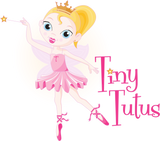Is My Child Too Young to Start Ballet? What the Research (and Our Teachers) Say
Is My Child Too Young to Start Ballet? What the Research (and Our Teachers) Say
Tiny Tutus offers ballet classes starting from 16 months of age, and yes, it’s absolutely the right time to begin. Research supports the value of creative movement, music, and routine for toddlers. With the right structure, early ballet helps children build coordination, confidence, emotional security, and a lifelong love of learning. You’re not starting too soon, you’re giving them the perfect beginning.
It’s a question we hear almost every day.
“She’s only two. Is she too young for ballet?”
And the answer, from years of research and thousands of ballerinas later, is clear:
Not at all. In fact, this is the perfect time.
At Tiny Tutus, we welcome ballerinas as young as 16 months. And we do it with joy, care, and a program written specifically for toddlers, not watered-down school-age classes. Our ballet isn’t a daycare activity. It’s age-appropriate, professionally developed, and rooted in early childhood education.
Why Start Ballet So Young?
According to early childhood movement experts and child development research, dance-based activities support toddlers in four powerful ways:
1. Physical Coordination
Ballet helps children develop gross and fine motor skills through purposeful movement. From simple walking patterns to controlled arm shapes, they’re learning to move with intention.
2. Emotional Security
Consistent class routines and familiar music create a safe space where little ones feel calm, seen, and supported. This emotional scaffolding helps them build trust in themselves and their teachers.
3. Musical Awareness
Toddlers are natural dancers, they feel rhythm long before they can count it. Ballet harnesses this instinct with classical music and tempo changes that stimulate listening and focus.
4. Cognitive Development
Our lessons incorporate memory-based patterns, imaginative play, and social turn-taking, all aligned with early brain development frameworks commonly used in high-quality preschools and learning environments.
But What If They Just Stand and Watch?
They will. Sometimes. And that’s okay.
Watching is learning. It’s part of how toddlers absorb information. At Tiny Tutus, our teachers are trained to support every type of ballerina, from those who leap straight in, to those who need a few weeks to settle in from the sidelines.
The key is patience. We never force a child to participate. We invite. We model. We encourage. And then, one day, they surprise you.
What Our Teachers Say
Our teachers see the magic every day. They’ve watched ballerinas who cried at every class walk into their recital beaming with pride. They’ve seen 17-month-olds curtsy. They’ve seen quiet toddlers take their first confident steps in a tutu.
They’ll tell you the same thing:
It’s not about being ready for ballet.
It’s about ballet being ready for them.
Our Curriculum Is Backed by Real Expertise
Tiny Tutus isn’t a dance class filled with props and time-fillers. Our curriculum was co-written by:
- Bronwyn Helmore, former Australian Ballet dancer and Royal Academy of Dance expert
- Simone Cadell, a nationally recognised early childhood educator
- Endorsed by Debbie Bradbery, Conjoint Lecturer in Education at the University of Newcastle, who confirmed its alignment with the NSW Quality Teaching Framework
This isn’t just play. It’s purposeful, powerful learning wrapped in pink tulle and soft shoes.
Final Thought
If you’ve been wondering whether it’s too early to start… we’d gently offer this:
You’re not rushing anything.
You’re not being unrealistic.
You’re recognising that your child is already curious, creative, and ready to be part of something beautiful.
Tiny Tutus is here to welcome you both, just as you are.
